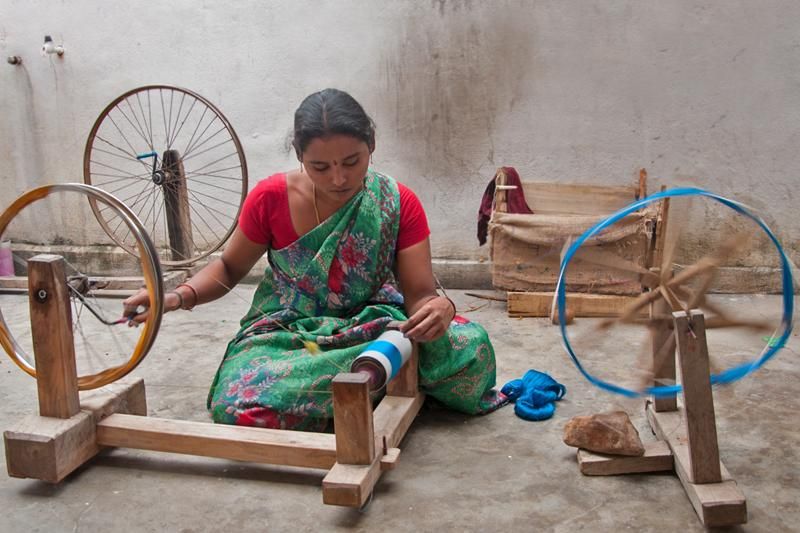From Aadhar Cards To Giving Them A Home, This Beloved ‘Didi’ Of Tribals Is Fighting For Their Rights
- IWB Post
- March 7, 2018

I remember asking my mother about snake charmers when I was young. While I eagerly waited for their shows and tricks, I was strangely concerned about where they lived. “Inka koi ghar nahi, ghumantu hain.” The answer disturbed my 11-year-old thoughts but I was no Mittal Patel, who gave up on her dreams of becoming an IAS officer to finally give them a home.
At the age of 35, married and mother of a six-year-old daughter, Mittal Patel handles more than her house. She manages the future of 28 nomadic tribes (NT) and 12 de-notified tribes (DNT) of Gujarat. The journey started in 2005 when, during her two-month fellowship with Charkha, she came across the tribal communities of Gujarat. Curious about their way of life and their peculiar tradition, she started researching about them and found the abject poverty they lived in, without even a flicker of hope of a better future.
Disappointed by the solutions the government was providing, she took matters into her own hands and formed Vicharta Samuday Samarthan Manch (VSSM) in 2006. Her aim? To make people realize that these tribal people are as human as anyone else and deserve the right to live with dignity. Well, I can go on gushing about how awe-inspiring her journey has been but let’s read her narrate her life story. Excerpts:
I can’t even begin to comprehend the magnitude of the challenges you have and are still facing, Mittal!
Oh, there have been many. Well, the major one was the roaming-wandering part of their tradition plus having their own Panchayats meant the inability to get out of their binding rituals and traditions. Not settling down in one place means no permanent address and that means no identity card. Plus the innocence they possess feeds their fear of outsiders breaching their life and knowing about them. I wanted to help them but their persistent resistance was hard to overcome initially.
Didn’t you try to take the help of government officials to help them?
Initially, when I would approach the officials, they would display their inability to do anything stating that there are no policies in place to help tribal communities. Many times they denied to even accept the existence of a particular tribe as they had no identity cards like voter ID or Aadhar card.
It truly is a hurdle. What did you do then?
I realized that their absence from the voter’s list exempted them from mainstream Government schemes, so in 2006-7, on a large scale, I took up this matter and presented it to the Chief Electoral officer in Gujarat. But the problem was that a roaming voter card is not given to anyone.
The tribal people sided me on the demand of a voter ID card, not because they wanted to vote in the elections but because they needed some proof to present to the police or the authorities of the places they would settle down in for some period to practice their traditional occupations, which in the absence of an identity proof became rather difficult.
I took the Chief Electoral Officer to the settlements of these tribal communities and he genuinely understood the problem then. They came up with a temporary solution where I had to give them in writing that I know the tribal people. Around 20,000 tribals were provided a voter ID after that.
An amazing feat! Now that they were armed with their IDs, the difficulties must have significantly diminished?
Not really. During the monsoon season, these tribes settle down in one village they have chosen years ago. While this had been going on for a long time, the village authorities were suddenly against them when the tribals used their temporary settlement of some months as their permanent address for the id cards (the solution we came up with later). Now they were considered as ‘foreign elements’ and not a part of the village.
Like once we got the government to sanction plots to some 8-10 tribal families in a village. It was the government’s land but when the villagers came to know they rallied against it, calling it their place and asked the collector to relocate the families. You see, they were and still are, in some places, not ready to adjust a small part of a very large community, so to expect them to accept the entire tribes is going to take a lot of time.
At least now they have the hopes of a better future on the horizon. If I am not wrong you didn’t just get them their voter IDs, did you?
Oh, I needed more for them to get some peace for my own soul. In 2013, after years of toiling, we got passed the resolution for the issue of their ration cards because it too needs multiple documents as authentication. So, seeing that we had already got them their voter ID cards, we made it possible for them to get a ration card based on it only.
Another policy was made that includes that in a village, the collector holds a significant stretch of land, which is not under the Panchayat jurisdiction, which he can give to the tribal families as residential plots.
Also, just last October, we got the resolution passed to get them caste certificates, via which they avail the government’s reservation schemes. Earlier they were asked to provide their father’s school education details for the same. I mean come on! They have been living like this for years, how can we expect them to conjure their father’s school certificate which doesn’t even exist.
The progress you’ve made is astounding. I want to know if tribal communities all over India face the same issues.
Sadly, yes they do. Be it the tribal communities in Rajasthan, Chattisgarh, Haryana or any other place, they are still drowning in poverty and unaware of their rights.
And now you have taken it upon yourself to correct the wrongs.
I am on this simple mission, Apeksha, that they too start dreaming, it’s their right to hope and see them turn into a reality.
Through the Criminal Tribes Act of 1871, 198 tribes were classified as “criminal” during the era of the British rule. Even though it was repealed later, the label remained with them and so did the misconceptions because of which they are still fighting for the most basic rights.
Of the tribes you’ve worked for, which one has been the closest to your hearts?
The community labeled as the most hardcore criminals – the Dafer tribals. Even today, if they are residing in a village and an incident happens, they are the ones to get nabbed first. Their settlements are burned down, impromptu arrests without any concrete evidence or warrant and beaten mercilessly. Okay, they do steal sometimes but has anyone given even a second’s thought to ponder the reason behind it?
They are living without resources! They have the will to work but nobody, not even the government, has time to think for their well being. When I came across this community, the ones who abstained from criminal activities lived in acute poverty. They have kind of became my top priority mission from then on.
And did you succeed in your mission?
To an extent, yes. As I had stated earlier, these communities are afraid of outsiders and the Dafer community is even more guarded. But today, I am their didi who has the privilege to even twist their ear or hell, slap them if they do anything wrong. I have this one big family that looks up to me and I have vowed to never let them be disappointed, not with me around.
Pulling the de-notified tribal communities from the pits of poverty and no identity, Mittal has braved the biggest atrocities to bring these communities the status of respect. Once denied entry, she today dines with the tribal families and all it takes is her one word for even the most notorious criminal of the tribes to give up on their wrong ways. The respect Mittal has today stems from 12 years of her selfless fight for their well being.
Stay tuned to know how such communities, though considered backward, are way above spreading gender disparity and how Mittal, single-handedly, gave countless tribals the chance to ditch, for once and for all, the tag of ‘criminals.’
This article was first published on January 20, 2018.
- 0
- 0













